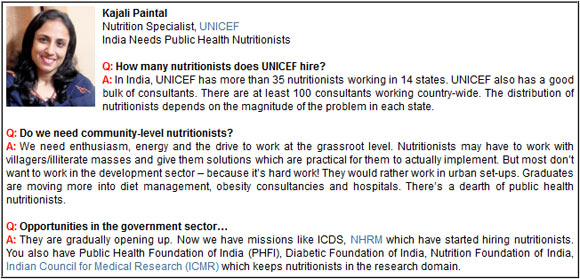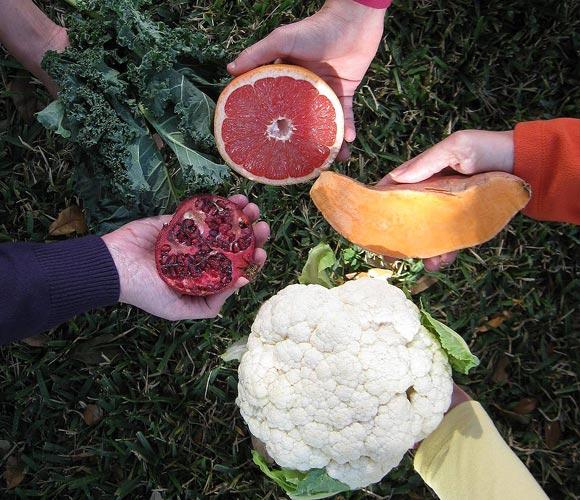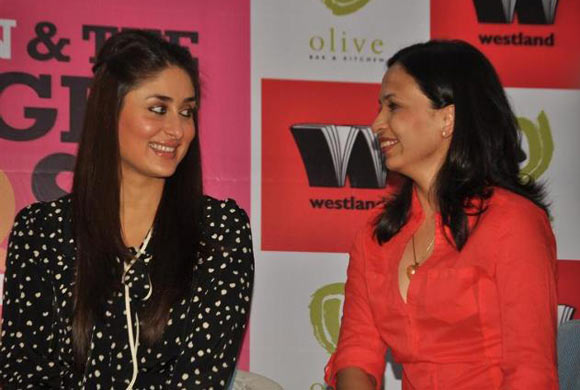Photographs: Courtesy Careers360 Shiphony Pavithran Suri, Careers360
This field positively impacts the health, fitness and the well-being of millions of people, everyday. Read on to know how you can pursue a career in nutrition
Rabia is very familiar with the nutritional value of food and easily prepares a diet planner for any body type.
She knows how many calories you should consume per day and what size of portions you should eat.
This third year BSc Nutrition and Dietetics student from Manav Rachna University aims to become a registered dietician in future.
She shares her internship experience at Vedanta Medcity hospital. “I applied my theoretical knowledge while planning diets for patients afflicted by lifestyles disease and chronic diseases related to diabetes, intestinal, kidney, heart, cancer.”
Nutritional support is inevitable for the health improvement of our country.
So, India, the global capital of diabetes and other diseases needs both curative and preventive nutrition.
Growth of nutrition
In India, nutritional studies kicked off in the 1930s.
In the early days, the attention was on finishing and grooming courses such as cooking and textile management.
Nutrition education started gaining visibility in the early 1960s.
At present, the domain has taken tremendous strides.
“Earlier, India was only addressing the problem of malnutrition. Today, the health scenario has changed drastically. Despite economic boom, India has enormous under/over-nutrition problems. So, our national plans and nutritional advice target these two issues,” says Kumud Khanna, Director, Institute of Home Economics (IHE).
“In our social projects, students survey the calories of the rural population and try to witness the behavioural changes in children, adults, handicapped people,” reveals Prof GI Khan, Dean-Allied Medical Science, Manav Rachna University.
Please click NEXT to continue reading...
Dietitians versus nutritionists
Image: For representational purposes onlyPhotographs: MD Anderson/Creative Commons
Dietitians
Also referred to as clinical or therapeutic dietitians, the titles vary across the workplace.
Essentially, they plan and supervise the preparation of diets designed for patients, and work in hospitals, clinics, healthcare centres, wellness programmes, sports centres or own private clinics.
“A dietician helps to plan and monitor an individual’s diet,” says Namrata, Senior Dietician at Dept of Gastroenterology and Human Nutrition, AIIMS.
In hospitals, they work closely with doctors and develop expertise in a particular medical domain. “Besides making the rounds of the respective wards, we check the quality and hygiene levels in the hospital kitchen. To excel, dieticians must be in tune with the medical world,” says Dr. Pratibha Singh, HoD Nutrition and Dietetics, Manav Rachna University. .
Nutritionists
They work in the areas of food science, community development, research projects and Fast Moving Consumer Goods Companies (FMCG).
Their work relates to research aspect. It could be in the field, desk or laboratory. Public health nutritionists work in the developmental sector. “They go beyond diets – move into the science of biochemistry, food science. They do not do so much of clinical nutrition as a dietician does,” says Kajali Paintal, senior nutrition specialist, UNICEF, India.
How to kickstart your career in nutrition
Image: For representational purposes onlyPhotographs: Wikimedia Commons
You can opt for a nutrition course after class 12.
The degree terminology differs from college to college.
At Delhi University, the entry point is BSc Home Science, of which food and nutrition is one subject.
At Manav Rachna, students can entirely focus on BSc Nutrition and Dietetics for three years.
In BSc Home Science (Hons), a student can specialise in Food and Nutrition in the second and third year, whereas in the Pass programme, there is no specialisation.
The Honours programme admits only students from science backgrounds as its subjects include biochemistry, botany, physics, zoology and chemistry.
Increasing need of nutritionists across sectors
Image: Kareena Kapoor with nutritionist Rujuta DiwekarPhotographs: Rediff Archives
"All our BSc graduates gets easily placed in hospitals; health clinics -- VLCC, bodycare; food industry -- Kellogs, Britannia, says Dr Singh.
Ruchika Chugh, Senior nutritionist at Global Alliance for Improved Nutrition (GAIN) who worked in the food industry for eight years shares her experience in the Research and Development centre of GlaxoSmithKline -- Consumer Healthcare (GSK).
“I used to develop new product concept, work on the claims, interface with different department regulatory and give them technical support,” she recounts.
At Dumex, her role was diversified. She prepared medical marketing kit.Incr
“I used to organise scientific conferences, KOLs (Key Opinion Leaders) management, prepare manuals, flip charts, leaflets, posters for sales force and eventually trained them. We also met doctors frequently to understand if a product is working,” she adds.
Many are hiring nutritionists for social welfare and developmental work. They also work in public health departments.
“Depending on the number of vacancies available, UPSC conducts interviews for posts at Food and Nutrition Board (FNB). If recruited you jump on to become a class-I gazetted officer,” says Dr Surindra Jain, Assistant Technical Advisor, Nutritionist at FNB, Ministry of Women and Child Development.
There are a sizeable number of nutritionists working as advisors, technical advisors or deputy advisors.
"There are 43 food and nutrition extension/field units across the country where a nutritionist's support is needed," she adds.

Expect good remuneration and opportunities abroad
Image: For representational purposes onlyPhotographs: Scott Bauer, USDA ARS/Wikimedia Commons
"The UK and US are best destination for health and nutritional programmes. Sports nutrition is picking up well in markets abroad, especially like Tsukuba university, Curtain University.
Earning potential
A fresher can earn between Rs 15,000 to 20,000 per month. After gaining a good experience, you may touch Rs 30,000 plus.
“In government hospitals, with the Sixth Pay Commission, the salaries have risen to Rs 25,000,” says Namrata.






Comment
article